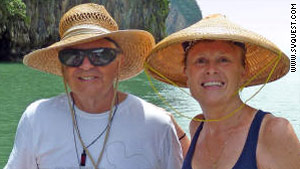Friends remember Americans killed by pirates

- Four Americans on the yacht were fatally shot, officials say
- Fifteen pirates are in custody; another four are dead
- Jean and Scott Adams were delivering Bibles to different places around the world
- Friends don't know why the yacht broke away from a larger group of boats
(CNN) -- Friends and family of Jean and Scott Adam -- avid sailors killed by pirates while on a round-the-world boating adventure -- mourned their losses Wednesday and tried to make sense of the tragedy.
The Adams, along with fellow sailors Phyllis Macay and Bob Riggle, were found shot to death after U.S. forces boarded their hijacked vessel around 1 a.m. Tuesday, U.S. officials said.
The 58-foot yacht, named the Quest, was being shadowed by the military after pirates took the ship off the coast of Oman on Friday.
The forces responded after a rocket-propelled grenade was fired at a U.S. Navy ship about 600 yards away -- and missed -- and the sound of gunfire could be heard on board the Quest, U.S. Navy Vice Admiral Mark Fox told reporters.
"Despite immediate steps to provide life-saving care, all four hostages ultimately died of their wounds," U.S. Central Command said.
"We're trying to deal with the grief of the loss," Clayton Schmit, a friend of the Adams, told CNN. "We've been praying earnestly over the weekend, and (since) we had the news that thing went bad, we've all been deeply in mourning."
Schmit, a Lutheran minister, is a professor at Fuller Theological Seminary in California, where Scott Adam taught as a graduate student.
The Adams were from Marina del Rey, California. Macay and Riggle were from Seattle.
The killings took place as negotiations involving the FBI were under way for the hostages' release, Fox said. Two pirates had boarded a U.S. Navy ship Monday for the negotiations, he said. He told reporters he had no information on details of the negotiations or whether a ransom had been offered.
Two pirates were found dead on board the Quest, he said. In the process of clearing the vessel, U.S. forces killed two others, one with a knife, Fox said. Thirteen others were captured and detained along with the other two already on board the U.S. Navy ship. Nineteen pirates were involved altogether, he said.
 State: Pirates to be held accountable
State: Pirates to be held accountable
 Security expert on pirates, hijacking
Security expert on pirates, hijacking
Fox said authorities believe the pirates were trying to get the vessel and hostages to Somalia, or at least into Somali territorial waters.
He added that it was the deadliest pirate hijacking involving U.S. citizens that he could recall. There have been fewer than 10 fatalities associated with pirate activity in the region in the past few years, he said.
The 15 detained pirates were being held together on a U.S. warship, Fox said, and "we will go through the appropriate process to bring them to a judicial process and hold them accountable for their activities."
Piracy has flourished recently off the coast of Somalia, which has not had an effective government for two decades. While piracy in the Indian Ocean has taken place for years close to the Somali coast, "in 2008 we saw a very marked and rapid shift into the Gulf of Aden, where Somali pirates were attacking and hijacking vessels very, very regularly," said Cyrus Mody, manager at the International Maritime Bureau in London.
International navies combating piracy have been fairly successful in setting up a patrolled transit corridor through the Gulf of Aden, Mody and Fox said. But the pirates' activities then shifted into the southern Red Sea, Indian Ocean and the Arabian Sea area, Mody said.
Over 50 pirate attacks have already taken place in 2011. As of February 15, pirates were holding 33 vessels and 712 hostages.
Schmit told CNN that the Adams were aware of the growing danger of piracy in the Indian Ocean, particularly near the Horn of Africa, where the Quest was located at the time of the attack.
While sailing around the world, the Adams were delivering Bibles to hospitals and schools in dangerous locations, Schmit said. "It was their mission in life and nothing was going to deter Scott."
"There are many places in the world where Christian missionaries are facing the possibility of capture and torture and death," Schmit added.
"Most of the people who embark on those kinds of missions are well aware of (the dangers). They're surrounded by prayer and uplifted by their friends and family. ... If they feel called, they typically go."
Schmit said the Adams didn't feel comfortable arming themselves while in dangerous waters. Scott Adams had noted, among other things, that "if you take a firearm on board and you stop at certain ports, your boat can be confiscated along with your cargo, so he didn't want to risk that."
The Adams, Macay and Riggle had been traveling with yachts participating in the Blue Water Rally since their departure from Phuket, Thailand, rally organizers said Sunday on the event's website. The group, which organizes long-distance group cruises, said the Quest broke off on February 15 after leaving Mumbai, India, to take a different route.
"We're all speculating" as to why the Quest broke away from the other boats, Schmit said. "Somehow they slipped through the hole in the safety net."
CNN's Mike Pearson, Ashley Hayes, Carol Cratty, David McKenzie, Alan Silverleib, and Jamie Crawford contributed to this report
